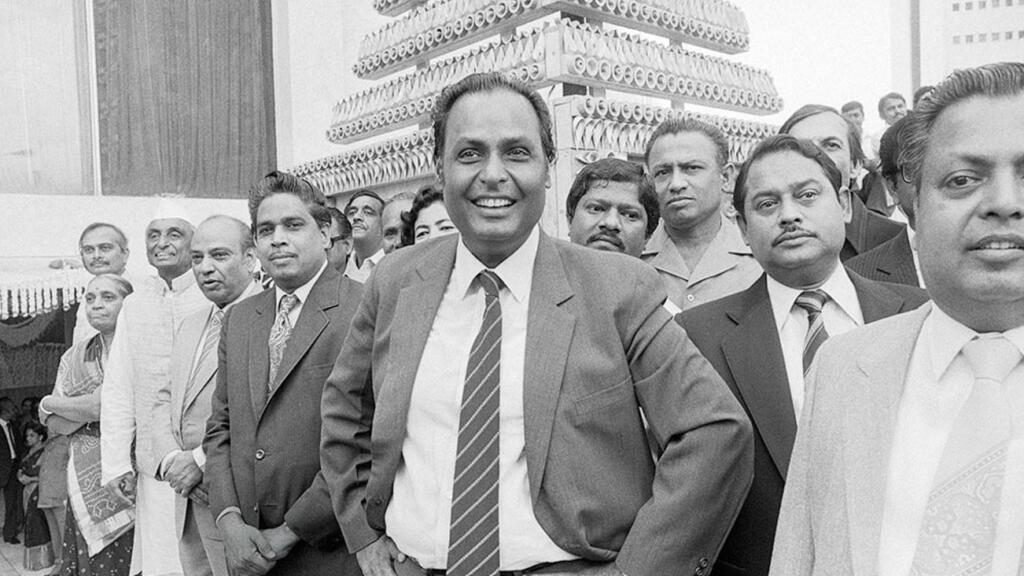Former Prime minister Manmohan Singh is often credited for resuscitating the Indian economy in 1991, during his stint as finance minister. However, way before LPG reforms, Dhirubhai Ambani, a common businessman without any political post had made some massive strides towards defeating a socialist political and economic system.
Dhirubhai played a key role in Junagarh staying in India
One of India’s biggest tycoons, Dhirubhai Ambani was born as Dhirajlal Hirachand Ambani on 28th December 1932 in the Junagarh district of modern-day Gujarat. His father was a schoolteacher who took care of his early education. Young Dhirubhai emerged as a key reason behind Junagarh not acceding to Pakistan during India’s partition.
Learned business acumen in Yemen
His organizing and oratory skills brought him laurels from reputed personalities including politicians and industrialists looking to re-build India. At the tender age of 16, Dhirubhai and his brother left for Yemen, to work for A. Besse and Co. He worked for more than a decade in a foreign land. Mukesh Ambani, his eldest son was born in 1957 in Yemen itself. In 1958, armed with all kinds of business acumen, he decided to return to India to expedite the country’s domestic textile production.
The textile business was a steppingstone for Ambani in India
After returning to India, Dhirubhai and his cousin Champaklal Damani started ‘Majin’. The company imported polyester Yarn from Yemen and exported spices to the same destination. Dhirubhai’s highly ambitious and risk-taking attitude did not fit well with his cousin, and both separated in 1965. Now, Dhirubhai was on his own.
Within one year of breaking away from Champaklal, he started Reliance Commercial Corporation in 1966. It later went on to become modern-day Reliance industries limited in 1973.
Soon, his brand of Polyester material became a huge household name. He had termed his brand as ‘Vimal’ polyester. It was used as a raw material in saris, shawls, suits, and dresses. A technical team of the World Bank visiting the ‘Reliance textiles’ manufacturing unit provided in 1975 a huge legitimacy to the brand.
By-passing socialism
The 1970s and early 80s were times when the socialist movement in India was at its peak. Indira Gandhi’s economic socialism imposed by brute force majority rule of emergency translated into various leaders emerging as regional voices of socialist redistribution agendas.
Since Dhirubhai Ambani had already flirted with socialism during his younger days; he was well-aware of the nitty and gritty as well as negative outcomes of this doctrine. He knew that a country or any forward-looking business organization cannot sustain itself on redistribution policy. He had already spent nearly two decades trying to cross through the maze of corrupt bureaucracy armed with central government’s unfavourable laws and rules of engagement.
Also Read: ‘Socialism was inserted during Emergency,’ BJP MP Rakesh Sinha calls for Socialism to be removed from Preamble
Dhirubhai now set his eyes on globalising the Indian business space. Unfortunately, his vision collided with ultra-socialist policies of the 80s and 90s. To mark itself as a competitive business, the cost of capital (daily needs to operate a manufacturing unit) needs to be negligible. This was virtually impossible when a businessman had to feed a broker standing in disguise of government servants.
Used political outreach as well as business sense to defeat socialism
Slowly, Dhirubhai started to mark his presence in administrative circles of Delhi. He had his friends at each echelon of administrative machinery, whether its peon or an IAS officer serving as secretary in ministries. His assertions and thoughts did not go unheard in government. Along with his political outreach, he used his business sense as well to bypass socialism.
He used a clever sleight of hand to reduce the capital cost to near zero. Dhirubhai used to raise high-cost debt instruments from the market. These included bonds, treasury bills, mortgages etc. The time between his raising of debts and repaying along with interest was utilised by Dhirubhai to convert them into equity shares. These equities were sold at a high premium. During his times, a simple formula yielded extensive results for him. He used to raise money through the formula.
Premium received on equity minus the interest paid on debt instruments used to be huge which translated into almost negligible interest paid by Dhirubhai Ambani.
Through this ‘equity cult’, Dhirubhai made sure that vultures of license raj did not affect his investment in new businesses.
Had to taste the bitter side of socialist overtures
Later, he came under attack by successive ministers. After the Eighth General Elections in 1984, VP Singh presented the annual budgets for 1985-86 and 1986-87. VP Singh was a socialist to the core who abhorred the industrialists. He organized raids against Dhirubhai Ambani. But this did not derail his mission, and 37 years after the raid, Reliance has the highest market cap in India.
Also Read: A Ready list of India’s worst Finance Ministers
A great fighter who led from the front
A fighter throughout his life, Dhirubhai breathed his last on 6 July 2002. His sudden death was due to the second stroke he suffered. Shri Atal Bihari Vajpayee, then prime minister of India paid his tributes in the following words, “the country has lost iconic proof of what an ordinary Indian fired by the spirit of enterprise and driven by determination can achieve in his own lifetime”
Later, a movie starring Abhishek Bachchan was released in 2007. It is believed to be an apt on-screen representation of Dhirubhai’s fight with the system. Dhirubhai showed how businesses can strive without tampering with the cultural values of a country. His biopic should be held as an archetypal story.
